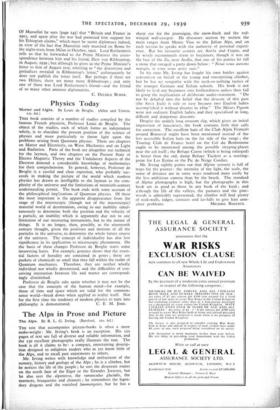Physics Today
Matter and Light. By Louis de Broglie. (Allen and Unwin. 12s. 6d.) THIS book consists of a number of studies compiled by the famous French physicist, Professor Louis de Broglie. The object of the studies, each of which forms an independent whole, is to elucidate the present position of the science of physics and more particularly to throw light upon the problems arising from Quantum physics. There are chapters on Matter and Electricity, on Wave Mechanics and on Light and Radiation. Parts of the book are altogether too technical for the layman, and two chapters on the Present State of Electro Magnetic Theory and the Undulatory Aspects of the Electron demand a considerable knowledge of mathematics for. their comprehension. In general, however, Professor de Broglie is a careful and clear expositor, who probably suc- ceeds in making the picture of the world which modern physics has drawn as intelligible to the layman as the com- plexity of the universe and the limitations of twentieth-century understanding permit. The book ends with some account of the philosophical implications of Quantum physics. Of these the most important is the apparent disappearance from the stage of the microscopic (though not of the macroscopic) material world of determinism, owing to our inability simul- taneously to determine both the position and the velocity 'of a particle, an inability which is apparently due not to any limitation of our measuring instruments, but to the nature of things. It is no longer, then, possible, as the nineteenth century thought, given the positions and motions of all the particles in the universe, to determine the whole future course of the universe. The concept of individuality has also lost significance in its application to microscopic phenomena. On the basis of these changes Professor de Broglie starts some interesting hares. For example, genetics shows that the essen- tial factors of heredity are contained in genes ; these are packets of chemicals so small that they fall within the realm of Quantum mechanics. Therefore, they are neither wholly individual nor wholly determined, and the difficulties of con- ceiving interaction between life and matter are correspond- ingly diminished.
Professor de Broglie asks again whether it may not be the case that the concepts of the human mind—for example, those of time and space which are valid for the common- sense world—break down when applied to reality itself. Not for the first time the tendency of modern physics to turn into






























 Previous page
Previous page